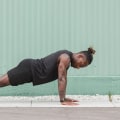Functional fitness is an important part of any athlete's training regimen. It helps to develop the body's competencies in various fields, including speed, strength, power, flexibility, agility, balance, aerobic and muscular endurance. For professional athletes who compete at elite levels in obstacle courses (OCR), adventure races, mountain skiing, mountain biking, dirt walking and trail running, functional fitness is an integral part of their training. When programming functional training routines for athletes, it's important to consider the types of movements involved in sports.
Instead of focusing on strengthening a specific muscle group, think about working on specific movements that involve the body as a whole. This includes exercises such as deadlifts, which target the hamstrings but also involve the trunk, dorsals, ankle stability and grip strength. Core exercises are also important for all sports and should be included in a single workout. It's also important to avoid overtraining athletes in the gym.
Too much time spent in the gym can detract from their skill practice, which is the most important part of their training. If they're struggling to recover from their last workout, then they can't do it properly. Exercise programs can be classified as strength, power, endurance and flexibility. However, there is no specific term to describe a comprehensive type of training that includes all four components.
When determining what functional training exercises to perform, it's important to think about the types of movements involved in sports and include all muscle groups in a single workout. There is evidence that functional training is beneficial to athletes' overall physical fitness. Studies have shown that it can increase physical fitness (speed, strength, power, flexibility, agility, balance, aerobic and muscular endurance) among athletes. However, there is no long-term follow-up data available to predict the long-term impact of functional training on athletes' physical fitness. Overall, this review provides substantial evidence of the good quality and beneficial effects of different functional training programs on physical fitness among athletes.
Functional physical training should develop people's competencies in various fields and promote functional training in the field of modern sports science.








